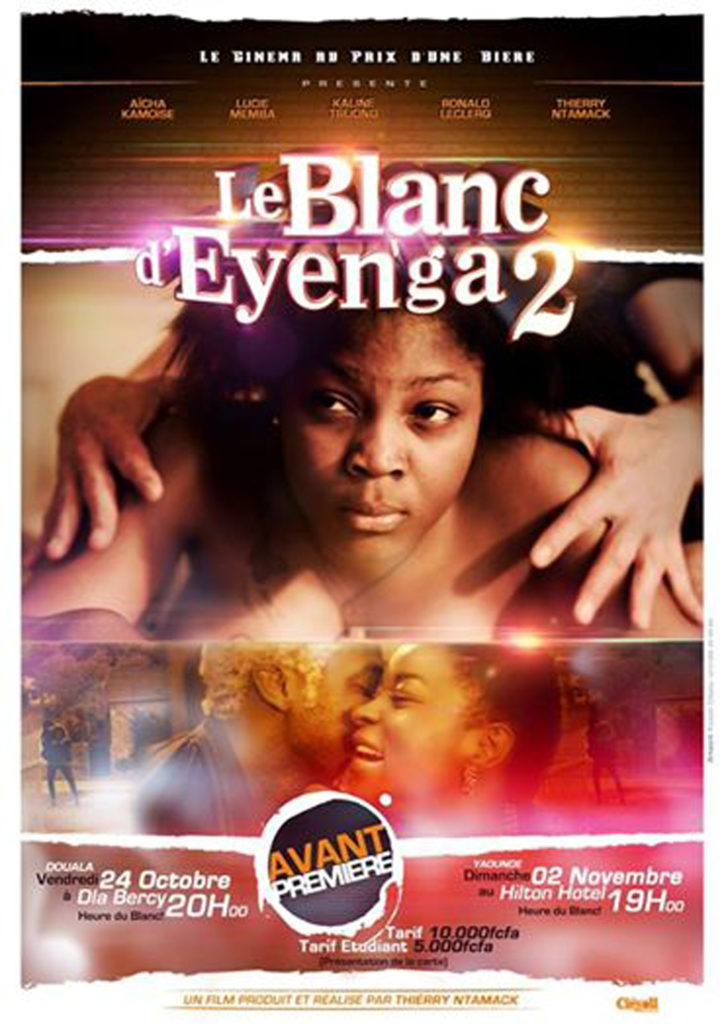Dzekashu MacViban
One of the most anticipated movie sequels in Cameroon perhaps delivers as much as it falls short.
The desire to leave Cameroon for greener pastures, an issue which is ingeniously documented in the movie Paris a tout Prix, serves as the backbone of Thierry Ntamack’s 2012 movie Le Blanc d’Eyenga. The movie relates Eyenga’s desperate attempts to find a white man on the internet who will marry her and take her to France. Eyenga (Jeanne Benti) is fed up with life in the Mboamanga neighborhood in Kribi and envious of her friends who have succeeded in finding white men who have taken them to France. This makes her team up with Molla (Thierry Ntamack), who finds the ideal person, but things don’t turn out as expected.
This movie is among the recent Cameroonian movies which have raised a huge wave of enthusiasm, a description which has eluded many Cameroonian movies of late, and the director, Thierry Ntamack, is back with a sequel, whose premier took place on 24 October at Douala Bercy and 2 November at the Hilton in Yaoundé.
The path leading to the creation of the sequel was not an easy one. Rather than complain about the lack of subventions like most people in the movie industry, the director secured finance using crowd funding, made possible by fans who sent airtime credit to particular numbers. This airtime credit was later “converted” into cash, which alongside other sources of finance, was used to shoot the sequel.
Sequels can be a tricky business, given that expectations are usually high and fans can be very unforgiving when a sequel spoils a franchise (to the point that they set aside their love for the first part). Blockbuster sequels have become too common such that A. O. Scott, writing for The New York Times decries the issue saying “it sometimes seems that every commercially ambitious movie these days, with the possible exception of certain romantic comedies, comes with built-in sequel potential.”
Le Blanc d’Eyenga 2 is plagued by several issues— first is its catastrophic premiere at Douala Bercy, where only part of the movie was screened due to alleged “format compatibility issues.” But the real problem is the film itself. The movie, which lasts for almost two hours, opens rather modestly and quite interestingly with a cut from “Banhiani” a track by Eko Roosvelt, and one quickly realizes that the hot-tempered quasi-aggressive Eyenga (Jeanne Benti) from the first part has been replaced by Aicha Kamoise. I have nothing against her and matter-of-factly enjoy her web serial Les Aventures Kamoises, but she wasn’t able to channel the impulsive and indefatigable spirit which Jeanne Benti brought to live as Eyenga.
There are scenes which take place at Molla’s bar (Le Sans-Calecon Bar) — several long and boring scenes which belabor the point that Molla is now rich and much “loved” because he happily shares money (which Eyenga sends to him from France). These scenes don’t really matter to the development of the movie, but they drag on endlessly and appear more than once.
Furthermore, the continuity of the movie seems to be contrived as the plot eschews several key aspects of the first movie and takes on a totally new direction. If one is patient enough, one can get accustomed to the new direction of the movie. In fact, after watching the first episode of season 2 of HBO’s True Detective, I was convinced it was a totally new series, thus, Le Blanc d’Eyenga 2’s change of plot is bearable, especially given that there is a continuation, though not the way one imagined. True Detective’s season premier seems to be better than that of season one— at least in terms of plot, though the dialogue and mood are nowhere near the genius of the first season. Despite Le Blanc d’Eyenga 2’s distance from the original plot, it still stays faithful the movie’s central theme.
Nevertheless, the director is able to ante up his game with innovations which make the movie worthwhile. The first of such innovations is a background narrative voice, which from the start of the movie already hints how much of a breakaway from the previous movie the sequel is. The voice is absent for most of the movie, featuring once in a while with insider information in a way which is quite akin to Inherent Vice. The sex scenes are bold, and unlike many Cameroonian movies where such scenes appear for their own sake, these are actually intertwined with the plot.
One sure thing remains the fact that this movie is one of the most anticipated movie sequels in Cameroon and whether or not it delivers as much as it falls short should not stop anyone from watching it.
